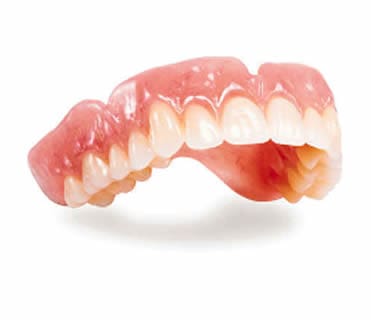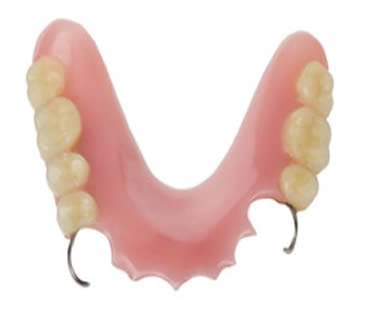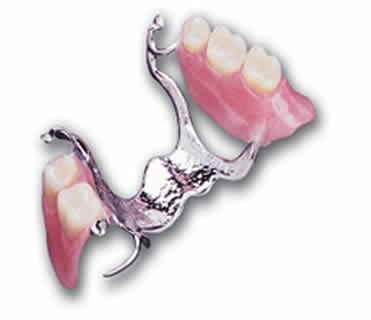Types of Dentures at a glance
 Complete Upper
Complete Upper
Acrylic Denture
 Partial Upper
Partial Upper
Acrylic Denture
 Partial Upper
Partial Upper
Cobalt-Chromium Denture
What are Dentures?
Dentures are removable appliances made to replace missing teeth to restore appearance and chewing function. Dentures can be partial or complete, depending on whether they replace some or all of the natural teeth. Dentures are intended to be worn during the awake hours only, and should be removed before sleep.
How are dentures made?
The making of a denture is a three-way process involving you, your Dentist, and the Laboratory Technician. Your Dentist will take a series of impressions and jaw measurements usually over 3 or 4 appointments and relay this information to the laboratory. On one of your appointments at Apollo Dental in Southend, your Dentist will provide a trial fitting, so you can check the appearance of the denture before it is finished. This will give you an opportunity to request any changes you may want. On the last visit the denture will be fitted and any adjustments made to ensure the appliance is comfortable and that it functions correctly. Your Dentist will give you advice on how to maintain your denture and you may be asked to return for a follow-up visit to check the denture after a period of use.
What are the types of Denture Available?
- Complete dentures are usually made of an acrylic base which is coloured and contoured to mimic natural gum tissue. The base also provides support to the face, filling it out to provide the correct profile and lip support. This base carries the artificial teeth which are also made of acrylic.
- Partial dentures can be made of either acrylic, or a hybrid of cobalt-chromium alloy for the base and acrylic for the teeth and gum tissue.
- Immediate Dentures - these are dentures made to be inserted into the mouth immediately after the extraction of teeth and are made from acrylic. The denture making process is carried out in the usual way and the finished appliance is placed in the mouth as soon as the extractions take place.
Immediate dentures provide a very useful, quick, and cost-effective method of replacing teeth on the same visit as the teeth are extracted. They can be a little uncomfortable for a few days after fitting because the new hard acrylic denture will sit on the extraction wounds. Your Dentist will give you appropriate advice on how to keep this discomfort to a minimum, but it is likely that you will have to return a week or so after fitting for some adjustments.
Immediate dentures should be considered as temporary appliances to fill the gap after extraction. The reason for this is that after extraction, the gum tissues shrink as part of the healing process for a period of 3 to 4 months. As this shrinkage progresses, the immediate denture will become progressively loose and may rock under chewing pressure. You may have to resort to using a denture adhesive for extra retention of the appliance. Once your dentist is satisfied that all gum shrinkage is complete, your Dentist will discuss with you the options available for replacing the missing teeth by more permanent means.
How long do dentures last?
The lifespan of a permanent denture is influenced by many factors, including wear and tear, loss of further teeth, and how well it is looked after. Your dentist will examine the denture at each check up to make sure it is still fit for purpose, but typically an acrylic denture can last up to five years, and cobalt-chromium dentures for 7 to ten years. Cobalt-chromium dentures tend to be more durable.
What can I expect when my new denture is fitted?
What you experience in the first few days after the fitting of a denture will depend on whether you are a long-time or first-time denture wearer. Any complications are usually minor and are short-lived, resolving by themselves after a few days.
Some of the sensations to expect include:
- Slight discomfort on the gums - a new denture is like a new pair of stiff shoes, it takes some breaking in. Any sore spots should disappear after a few days, but any that persist will require alteration of the appliance by your Dentist.
- Altered speech - when front teeth in particular are replaced with a denture, the speech may be altered temporarily, usually for only the first 12 hours or so. Persistence with wearing the appliance will overcome this and the speech usually returns to normal very quickly.
- A feeling that the denture is too bulky - dentures not only replace the missing teeth, but also all the gum tissue that has shrunk away since loss of the teeth. This feeling is mainly noticed by patients who have had missing teeth for many years and have not had a denture to replace them. The tongue and cheeks become used to the extra space available, which is then removed by a denture. This can also lead to a patient occasionally biting the inside of their cheek as they become accustomed to the new teeth.
- The sensation of loss of taste - this mainly affects people wearing an upper denture, with coverage of the palate, for the first time. It is mainly a psychological issue as the vast majority of the taste buds are located on the tongue. Reassurance is usually all that is required to overcome this sensation.

